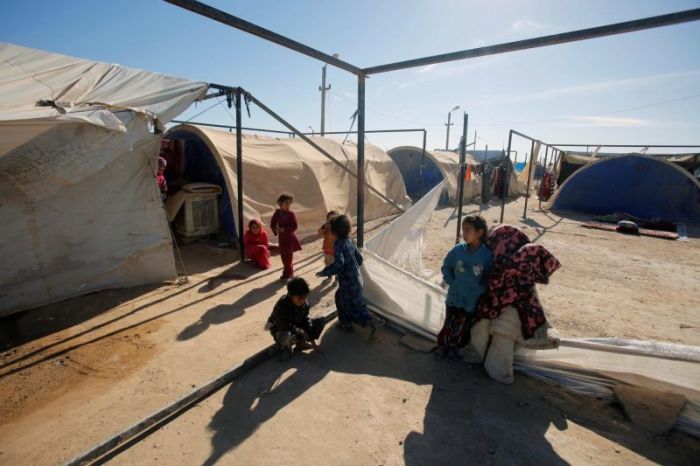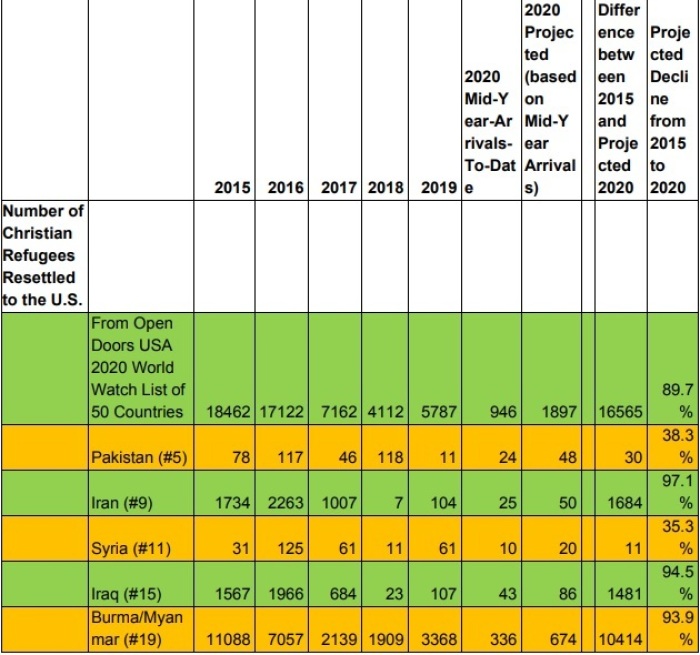90% fewer Christians who are facing persecution being resettled to US since 2015

There’s been a nearly 90% reduction in the number of Christian refugees being resettled to the United States from countries where churches face the greatest persecution since 2015, according to two leading evangelical humanitarian organizations.
Open Doors USA, a watchdog group that monitors the persecution of Christians in over 60 countries, teamed up with the refugee resettlement agency World Relief, the humanitarian arm of the National Association of Evangelicals, to release a new report Friday.
The 16-page report, titled “Closed Doors,” is critical of policies that have drastically reduced refugee resettlement to the U.S. in recent years and others that have made it increasingly difficult for persecuted individuals and families to seek asylum.
“There have been many recent changes regarding refugee resettlement and asylum law that has effectively shut the door on many of the refugees from being able to access protection in the United States of America,” World Relief Vice President of Advocacy and Policy Jenny Yang told reporters on a press call Friday.
“As organizations that are working to help those that are fleeing religious persecution, particularly Christians, we feel like it is of the utmost importance that the ... U.S. keeps its doors open.”
The report includes testimonies from persecuted Christians as well as data comparing the numbers of refugees resettled during the final years of the Obama administration to the drastically decreased numbers resettled under President Donald Trump.
The report finds that 18,462 Christians from countries listed on Open Doors USA’s influential annual list of 50 worst countries where Christians face persecution were resettled to the U.S. in 2015 and 17,122 Christians from those countries were resettled in 2016, the final two years under Obama.
By comparison, only 946 Christians from those countries on the Open Doors World Watch List were resettled in the first half of the fiscal year 2020. The report estimates that if projections remain steady, only 1,897 Christians from those 50 countries will be resettled by the end of the fiscal year 2020, which represents a reduction of 89.7% from 2015.

The purpose of the report, organizers said, is to stress how policy changes enacted by the Trump administration since 2017 — including the cutting of the U.S. refugee resettlement ceiling — have impacted persecuted Christians abroad. The report was not published to suggest that Christians should be prioritized over refugees of other religious backgrounds.
“We do unabashedly believe, however, immigration and asylum policies must be addressed in order to protect those who, because of persecution on account of their faith in Christ, have been forced to flee their countries,” the report stresses. “Scripture teaches us that the global Church is a single body, and that when one part suffers, we all are to suffer with it (1 Corinthians 12:26).”
According to World Relief, the world is facing its worst refugee crisis since World War II and there are believed to be 80 million people throughout the world displaced from their homes. The United Nations estimates that about 1.4 million displaced people in 60 refugee-hosting countries are in need of resettlement.
Open Doors USA CEO David Curry, a respected religious freedom advocate, told reporters that while the Trump administration has championed the president’s promise to promote religious freedom and protect persecuted Christians overseas, its changes to policies on refugee resettlement as asylum law have created a “gaping hole” in that promise.
Curry said he would like to see the Trump administration prioritize the refugee resettlement program and noted that there are over 250 million Christians worldwide experiencing severe levels of persecution for their faith in Jesus.
Open Doors has reached out to the State Department and the National Security Council about this issue.
“This is an opportunity for them to address something that hasn’t been addressed,” Curry said. “We are hopeful and want to encourage them to step up and take significant steps to address this refugee issue.”
World Relief is planning to send the new report to the office of Sam Brownback, U.S. ambassador-at-large for international religious freedom. Yang said she plans to raise the issue on Tuesday during the weekly international religious freedom roundtable meeting in Washington, D.C., and will discuss it with Brownback directly. The report will also be sent to staffers on the House Judiciary Committee and the Senate Foreign Relations Committee.
Last year, Christian groups voiced their displeasure after the Trump administration announced another cut to the U.S. refugee resettlement ceiling after resettling 22,874 refugees in 2018.
The administration proposed a record-low ceiling of 18,000 refugees resettled to the U.S. in the fiscal year 2020. But to mitigate the COVID-19 crisis, the administration has further restricted refugee resettlement. The new report states that fewer than 7,600 refugees have been resettled to the U.S. in 2020 with just three months left to go in the fiscal year.
The resettlement program is "still largely halted,” the report reads.
Both organizations believe that the refugee ceiling should be raised to an annual 95,000 refugees resettled to the U.S. per year, which is 2,000 refugees under the number resettled to the U.S. in 2016, the final year of Obama’s presidency.
“The U.S. government needs to have a strategy to help those people who are specifically targeted for their faith expression,” Curry said. “These people may need to have some sort of refugee status in the U.S. The fact that we sort of blanket block it is not a sufficient answer. Christians need to speak out on this issue.”
The new report goes into detail and criticizes a series of policies enacted by the administration in recent years reinterpreting how U.S. asylum law is to be applied for those seeking to claim asylum at the border or upon entry into the U.S.
World Relief CEO Tim Breene said that a new rule proposed last month by the Department of Justice and Department of Homeland Security effectively “redefines” what qualifies as persecution and “reduces eligibility for asylum.” The public comment period for the rule proposal ends July 15.
“Proposed regulations change the standard for the evidence necessary to request a hearing before an immigration judge,” Breene warned. “They significantly redefine key terms, including what we mean by ‘persecution.’ They severely restrict the opportunity to be granted asylum for any individual who transited through other countries. There are many places where people are persecuted who can only get here by transiting through other countries. This is really a further dramatic reduction in accessibility for those fleeing persecution.”
Breene argued that it is possible to resettle refugees in the U.S. while also taking the precautions necessary to mitigate the spread of COVID-19.
Open Doors USA, an influential evangelical organization whose annual World Watch List report is utilized by members of Congress, federal officials as well as churches nationwide, has largely been supportive of the U.S. government’s drive under the Trump administration to prioritize issues of religious freedom.
The president even signed an executive order last month related to the topic of international religious freedom, which Curry praised in a later interview with The Christian Post.
“This administration has been really exceptional in how it communicates on [international religious freedom]. At the same time, it has fallen down on this issue and those two things (asylum and refugee policies),” he commented. “It is not contrary for us to call out where the administration needs to step up and where Christians need to speak out on this issue. Frankly, some people can not safely stay in their countries.”
Curry stressed that Open Doors is not a political group and is happy to work with both sides.
“I have no problem applauding the way this State Department has addressed religious liberty. [But] this is a shortcoming. The secretary of state and others within the State Department need to recognize now, three years into this administration, that they have fallen down on this issue. … This is an opportunity for them and they need to step up. I think that is why this report is so important.”
Follow Samuel Smith on Twitter: @IamSamSmith
or Facebook: SamuelSmithCP




























